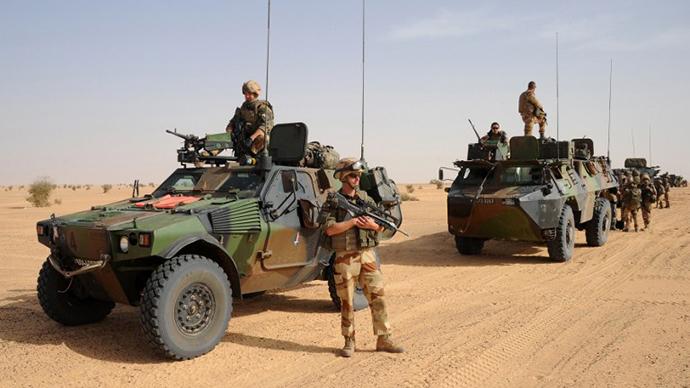‘New race for colonies begins in Africa’

Western ‘neo-colonial’ powers – particularly France - have started to reach back to West Africa, masking their colonial ambitions as ‘humanitarian intervention to protect human rights,’ Ken Stone from Hamilton Coalition to Stop the War stated to RT.
Earlier this week, France sent its special forces to Cameroon in
search of seven French tourists who were kidnapped in the north of
the country on Tuesday. Paris accused the Nigerian terrorist group
Boko Haram of being behind the abduction. On Thursday, the
kidnapped tourists were reportedly found alive in an abandoned
house in Nigeria.
France – whose presence in Africa used to be rather strong – still has several military bases and hundreds of troops on the continent. In the past several years, Paris’ has intensified its activity in former colonies.
First, there was its mission in the Ivory Coast. And in January
this year, France launched a military operation in Mali to help the
local government fight Islamist rebels. Finally, this week its
troops entered northern Cameroon.
RT asked Ken Stone from Hamilton Coalition to Stop the War if French involvement in West Africa has become a trend.
Ken Stone: Yes, I’m afraid so. And the trend is called ‘neo-colonialism.’ It’s a part of the old colonial powers reaching back to Africa for its resources where they used to operate a century ago.
France was the colonial power in West Africa and during its many decades there it literally enslaved the people of West Africa to work in their mines, in their factories and on their plantations. In fact, slavery wasn’t even abolished in Mali until 1905.
After WWII, the colonial powers of Africa were kicked out by national liberation movements which were somehow supported by the former Soviet Union.
However, after the Soviet Union collapsed and the US war on terror began, the former neo-colonial powers were once again flexing their muscles. And they were starting to reach back to Yugoslavia, and to Iraq, Afghanistan, Libya and now into West Africa.
If the main product of Mali, for example, were mushrooms, there would be no French troops there or in Niger. But the main export is uranium. And that’s very important to the French. And that’s why the French are there, that’s why NATO is there, that’s why – unfortunately - Canada is there as well.
I think the main point is this is unfortunately a trend. Like the 19th century race for colonies, we have we have the 21st century race for colonies beginning. That’s a tragic fact.
RT: With militants being active in Algeria, Mali, Nigeria, and Cameroon - what is really happening in West Africa?
KS: It’s a complicated situation. Many of the national boundaries that were drawn by the colonial powers have no parrying at all on the location of the indigenous nations of Africa. So, people are divided on different sides of boundaries. Most people don’t even recognize many of the boundaries in the Saharan region and the sub-Saharan region.
There’s a further problem. The West has introduced Al-Qaeda-type terrorists into Africa where they want them, where they didn’t exist in any significance before. So that has created a can of worms.
The main point though is that the Western powers – the European neo-colonial powers, the US and NATO – have no right to act as the police of the world.
In the 19th century race for colonies, they said that they had the white man’s burden to carry on their shoulders to civilize the people of Africa. In the 21st century they call it the “humanitarian intervention to protect the human’s rights.” Those are both frauds and the Western countries really have absolutely no say in what goes on in West Africa. They should have no say.
RT: What are the chances the special-forces deployment in Cameroon could escalate into a full-scale operation, like in Mali?
KS: It could. But it’s not likely. Ever since their colonial rule ended, the French’s had a policy of ‘force de frappe’ – which is striking force, an expeditionary force, a special force – where they go in and they deal with a certain immediate problem and they leave. They do not have the stomach to maintain an occupation for a long period of time.
The problem for neo-colonial powers like France is that the so-called ‘rebels’ or Jihadists or whoever it may be, merely have to melt into the bush wait and out the expeditionary force. And when the expeditionary force leaves they come right back in. And the problem is that there is no permanent fix to this.
The statements, views and opinions expressed in this column are solely those of the author and do not necessarily represent those of RT.












